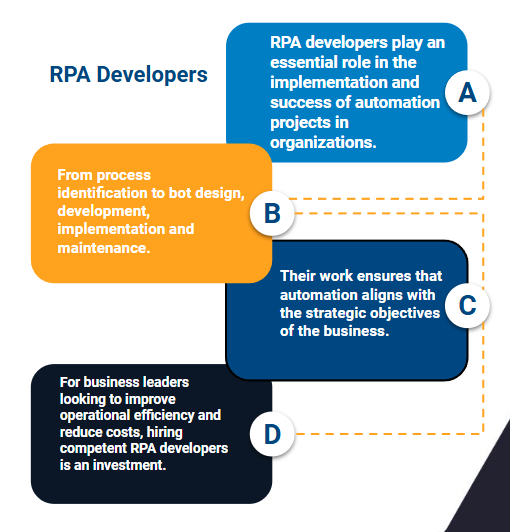
In today's fast-paced business world, operational efficiency is crucial. Robotic Process Automation (RPA) has emerged as a transformative solution to streamline workflows and reduce operational costs.
To implement this technology, organizations need to rely on specialized RPA developers, who play a pivotal role in carrying out automation projects. In this article, we will explore the key responsibilities of RPA developers and how their work impacts organizations.

The Innovation Story of "TechCorp"
To better understand the role of RPA developers, let's imagine the story of "TechCorp," a financial services company that decided to embark on an ambitious automation project. Faced with challenges of efficiency and accuracy, TechCorp's leadership decided to invest in RPA to improve its internal processes. This is where RPA developers come into play.
Understanding the Work Environment
RPA developers at TechCorp started by deeply understanding the business processes that needed automation. Their first responsibility was to meet with company stakeholders, including business units, process analysts, and IT teams, to identify areas where RPA could bring the most value. This discovery phase is crucial, as it lays the foundation for the success of any automation project.
Bot Design and Development
With a clear understanding of the requirements, TechCorp RPA developers embarked on bot design and development. Using advanced tools such as UiPath, Blue Prism, or Automation Anywhere, they began creating automated scripts and workflows. This phase involves programming bots that can perform repetitive tasks with high accuracy and speed.
For example, at TechCorp, one of the first bots developed was to automate the customer data verification process. This process, which used to take hours of manual work, was now completed in minutes with impeccable accuracy, freeing up employees for more strategic tasks.

Testing and Validation
Once developed, the bots went through rigorous testing and validation. RPA developers were tasked with ensuring that each script worked flawlessly under different scenarios and conditions. This phase is essential to detect and fix bugs before the bots are deployed in a production environment.
At TechCorp, the RPA developer team worked closely with end users to test in real-world situations, fine-tuning the bots based on the feedback received. This ensured that the bots were not only technically sound but also aligned with business needs.
Deployment and Monitoring
With testing completed, it was time to deploy the bots into the production environment. RPA developers oversaw this process to ensure a smooth transition and minimize any disruption to TechCorp’s day-to-day operations. But their work didn’t end there. RPA implementation requires continuous monitoring to ensure the bots are functioning properly and continue to meet business objectives.
RPA developers at TechCorp set up a monitoring system that allowed them to track bot performance, detect potential issues, and make adjustments in real time. This proactive monitoring is vital to maintaining the efficiency and effectiveness of automation.
Maintenance and Updates
The business environment is dynamic and processes can change over time. Therefore, RPA developers at TechCorp also took care of maintaining and updating the bots. This included making adjustments to scripts when business processes changed, as well as incorporating new functionalities to improve the performance and adaptability of the bots.

Training and Knowledge Transfer
One of the critical responsibilities of RPA developers is to train internal staff and transfer knowledge. At TechCorp, developers organized training sessions so that employees could understand how to interact with bots and how to report issues or suggestions for improvements. This empowered employees and ensured the successful adoption of RPA technology across the organization.
Continuous Innovation
RPA developers do not just focus on current tasks but are also always on the lookout for new opportunities to improve and expand automation within the organization. At TechCorp, RPA developers participated in innovation sessions to identify new processes that could benefit from automation, keeping the company at the forefront of operational efficiency.

The Impact of RPA Developers
The impact of RPA developers on an organization like TechCorp is profound. Thanks to their efforts, the company experienced a noticeable reduction in processing times, increased accuracy in repetitive tasks, and a significant freeing up of human resources for strategic tasks. TechCorp business leaders quickly saw a return on investment in RPA, with improved customer satisfaction and increased market competitiveness.
RPA developers play an essential role in the implementation and success of automation projects in organizations. From identifying processes to designing, developing, deploying, and maintaining bots, their work ensures that automation aligns with strategic business objectives.
For business leaders looking to improve operational efficiency and reduce costs, hiring competent RPA developers is an investment that offers significant and sustainable benefits. At our company, we have the experience and talent necessary to carry out these projects, helping organizations transform their operations through intelligent automation.
We recommend on video
